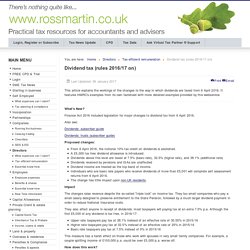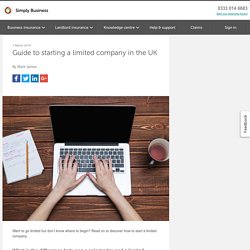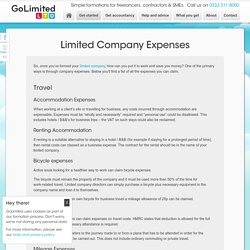

Mortgages for limited companies: what property investors need to know – Property Geek. For reasons I’ve covered extensively elsewhere (largely boiling down to “tax”), more and more investors are deciding to buy properties within a company.

See: Many of these investors want to use a mortgage to buy the property – and this is where lots of confusion and misunderstandings kick in. While you’ll need a mortgage broker to take you through the finer points of what’s available, in this article I’ll set out the main “structural” issues that often confuse investors looking into this for the first time… Trading company v SPV For our purposes, a “trading company” is one that has a primary activity other than owning property.
What you need to know: Limited Company Buy to Let FAQ - Bespoke Finance. Buy-to-let: How to set up as a company to save tax, and when it's worth it. It’s true that you can circumvent these charges through setting up a business.

But this is a far from simple process, and there are several pitfalls that need to be avoided along the way. "Corporations are looking really attractive at the moment," said Simon Collins, of broker John Charcol. "But they only work for certain types of investors, and people have to be aware of the implications further down the line.
" How to get started Most landlords will need to set up special purpose vehicle in order to buy the property. Then select the appropriate SIC (Standard Industry Classification) code which relates to letting property. . • Buy-to-let investors 'to sell 500,000 properties' as confidence plummets. Dividend tax (rules 2016/17 on) Last Updated: 06 January 2017 This article explains the workings of the changes to the way in which dividends are taxed from 6 April 2016.

It features HMRC's examples from its own factsheet with more detailed examples provided by this webservice. What's New? Company Formation - Online Company Formation & Registration by Company Format... Why consider a buy-to-let limited company? Setting up a limited company in the UK: a step-by-step guide. Want to go limited but don’t know where to begin?

Read on to discover how to start a limited company. What is the difference between a sole trader and a limited company? The bulk of the UK’s self-employed operate as sole traders; this legal structure is the choice of many because of its simplicity. As it’s easy to set up and brings relatively few legal responsibilities, working as a sole trader suits many aspiring and established businesses.
On the flip side, sole traders face unlimited liability, meaning that there’s no legal distinction between them and their business. Elsewhere, sole traders aren’t always tax efficient, and setting up a limited company could be a better option - especially once your earnings reach around £25,000 or more. Does starting a limited company sound appealing? Step one: choose a name In contrast to sole traders, no two limited companies are allowed to share the same moniker.
Step two: decide on the number of directors Step three: pick your incorporation platform. Company Name Availability Checker - Companies House. Setting Up a LTD Company, Starting a Limited Company. Limited Company Expenses. So, once you’ve formed your limited company, how can you put it to work and save you money?

One of the primary ways is through company expenses. Below you’ll find a list of all the expenses you can claim. Travel Accommodation Expenses When working at a client’s site or travelling for business, any costs incurred through accommodation are expensable. Renting Accommodation If renting is a suitable alternative to staying in a hotel / B&B (for example if staying for a prolonged period of time), then rental costs can classed as a business expense. Bicycle expenses Active souls looking for a healthier way to work can claim bicycle expenses.
The bicycle must remain the property of the company and it must be used more than 50% of the time for work-related travel. Where a worker uses their own bicycle for business travel a mileage allowance of 20p can be claimed.